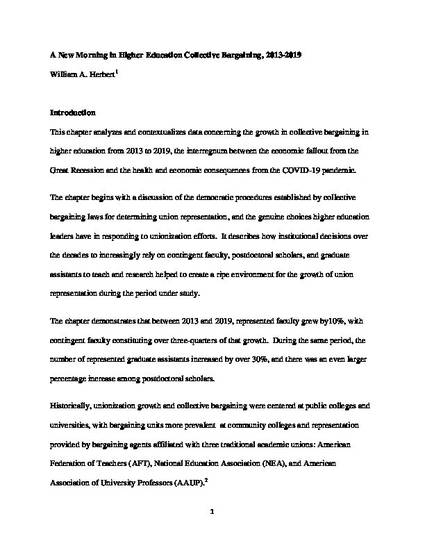
Contribution to Book
A New Morning in Higher Education Collective Bargaining, 2013-2019
Collective Bargaining in Higher Education Best Practices for Promoting Collaboration, Equity, and Measurable Outcomes
(2021)
Abstract
This chapter analyzes and contextualizes data concerning the growth in unionization and collective bargaining involving faculty, postdoctoral scholars, and graduate assistants from 2013 to 2019, the period between the economic fallout from the Great Recession and the consequences of the COVID-19 pandemic. It discusses the democratic values underlying collective bargaining and the historical and legal development of unionization at public and private institutions over the decades. It identifies three significant new trends in the period 2013–2019: a groundswell of new collective bargaining relationships at private institutions involving contingent faculty and graduate assistants; the rate of bargaining unit growth at four 4-year public institutions outpacing community colleges; and the increased role of non-traditional academic unions in representing faculty, postdoctoral scholars, and graduate assistants. Lastly the chapter presents data concerning work stoppages during the seven-year period and analyzes collectively negotiated agreements reached to resolve issues related to the COVID-19 pandemic.
Keywords
- collective bargaining,
- unionization,
- higher education
Disciplines
Publication Date
November, 2021
Editor
Daniel J. Julius
Publisher
Routledge
Publisher Statement
Each individual author or contributor can also choose to upload one chapter from the ‘Accepted Manuscript’ (AM). An AM is typically the post-contract but pre-production (i.e. not copy –edited, proofread or typeset) Word Document/PDF of the chapter. Authors may upload the AM chapter to a personal or departmental website immediately after publication of the book - this includes posting to Facebook, Google groups, and LinkedIn, and linking from Twitter. Authors can also post the AM book chapter to an institutional or subject repository or to academic social networks like Mendeley, ResearchGate, or Academia.edu after an embargo period of 18 months for Humanities and Social Sciences books or 12 months for STEM books.
Citation Information
William A. Herbert. "A New Morning in Higher Education Collective Bargaining, 2013-2019" New York and LondonCollective Bargaining in Higher Education Best Practices for Promoting Collaboration, Equity, and Measurable Outcomes (2021) Available at: http://works.bepress.com/william_herbert/48/
